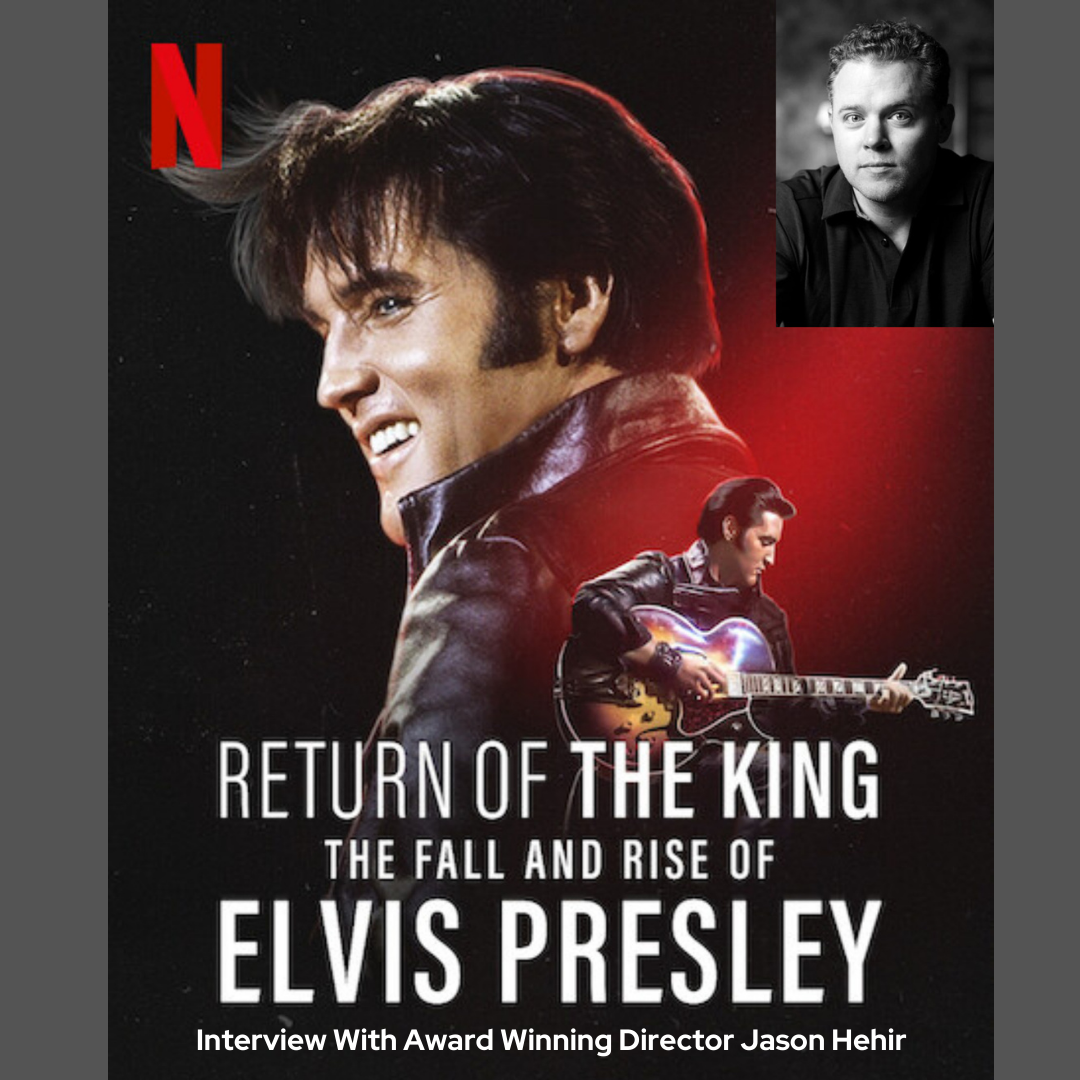How does one go about humanizing a larger-than-life American icon? Award-winning director/producer Jason Hehir takes on that challenge in his most recent endeavor, the Netflix documentary Return of the King: The Fall and Rise of Elvis Presley.
Jason joined the Ionian’s Connor Coppola to discuss the process of making this documentary, which started back in the summer of 2020.
Q: Did Netflix approach you, or were you the catalyst for making a documentary about Elvis?
Hehir: I had a meeting with a production company after The Last Dance aired, and they asked me what projects I would want to work on next. We batted around a few ideas, but nothing really stuck, and as I was getting off the phone call, someone casually mentioned, “We also have access to the Elvis Presley estate.” They didn’t realize that I was an Elvis fan and my family were also big Elvis fans, and I said, “Wow! that’s interesting.”
After hearing about the potential opportunity to make an Elvis documentary, Hehir asked “what’s next in the process?” This led to him getting on a call with Priscilla Presley.
Hehir: I pitched to her (Priscilla) that the ‘50s & ‘70s of Elvis’s life already had a fair amount of coverage, but the ‘60s Elvis was largely an unexplored period. He was mired in these mediocre movies, and I told her that I imagined that he was very frustrated and possibly depressed that the world and music landscape was changing around him, when just a decade ago, he was the most relevant figure in pop culture. Now in the ‘60s, he was seen as a guy who was doing family entertainment and no longer on the cutting edge of Rock ‘n’ Roll.
Once Hehir conveyed his vision to Priscilla, the next step was pitching this idea to the biggest streaming platform in the world, Netflix.
Hehir: You guys (Netflix executives) probably know me as a sports documentarian, but I see this in a way as a sports story. Elvis has one play left at the 50-yard line with no time on the clock and has to heave a Hail Mary. If he completes that pass, his career as a musician is allowed to continue, but if he doesn’t, Elvis as a musician is done. Not only does Elvis complete the pass, he delivers one of the most indelible performances in the history of rock ‘n’ roll.
Netflix agreed with Hehir’s vision, and the project was underway. However, obstacles soon arose. One of the main challenges in making a documentary on an event that happened 56 years ago is the limited number of people who are alive to tell a first-person account of this performance. Hehir had to look outside the box for other resources that would add personality to show the audience the magnitude of this performance.
Q: What was the process in selecting Bruce Springsteen and Conan O’Brien as main interview subjects for this documentary?
Hehir: Springsteen is on record as being a massive Elvis fan, and in particular, I was interested in the genesis of his musical career and how that all started when he watched Elvis Presley on the Ed Sullivan Show. This led to Bruce begging his mother to take him to a music shop and rent out a guitar. Bruce is larger-than-life and if someone like that (Springsteen) admires somebody else (Elvis) you can only imagine the size of that person, it’s like a mountain that only gets bigger.
When selecting O’Brien, Hehir was drawn to Conan’s almost encyclopedic knowledge of early Rock ‘n’ Roll and his deep affinity for the early Elvis recordings.
Hehir: I kind of threw a Hail Mary of my own and sent an email to him to see if he had any interest in this story. I wrote, “I respect your knowledge of the subject and the kind of person you are and would love for you to be a part of this.” He responded immediately and said yes, which was a pleasant surprise.
With Springsteen and O’Brien on board, the focus for Hehir shifted to exploring the unforgettable moments that made the ‘68 Special so iconic.
Q: Was there a particular segment of the ‘68 Comeback Special that stood out to you?
Hehir: Currently I’m sitting in my office next to a painting of Elvis in the white suit doing If I Can Dream that my brother got me for Christmas 10 years ago, so I’ve always had a place in my heart for that performance. Not only the symbolism that it represented in 1968 when he was singing about the assassinations of Bobby Kennedy and Martin Luther King, but If you look at the lyrics from a personal standpoint, it is also so autobiographical for Elvis. He is finally singing for himself and being the Elvis that he wants to be.
The documentary poignantly highlights Elvis’s humanity and humility, revealing that despite his immense wealth and fame, he always felt just a heartbeat away from returning to the impoverished streets of Tupelo, Mississippi.
Q: Was there a point of emphasis on showcasing the human side of Elvis Presley to the audience?
Hehir: Yes, that’s the goal in almost anything I do if it involves a famous person who we otherwise might consider a two-dimensional figure. When it comes to an iconic person, I’ve always been fascinated by the human behind the statue. There may be nobody more iconic in American or global culture than Elvis Presley, so I’ve always been fascinated by what kind of a person he was. I’ve had the opportunity to interview a lot of celebrities in my line of work, but I’ve never met anyone who knew Elvis Presley or even got the chance to shake his hand. So, when doing this documentary or the Michael Jordan one, one of the goals is to take someone who might be seen as a poster on your wall and make them into a human being. I also love examining people at a crossroads, no matter how rich and famous you are, everyone goes through ups and downs in life, and there was no greater crossroad for Elvis than the one he was facing in 1968.
Within the last five years, Jason Hehir has had the opportunity to do documentaries on arguably the most famous athlete in American history, Michael Jordan, and one of the most famous musicians in American history, Elvis Presley.
Hehir: I feel enormously grateful that I’ve had the opportunity to tell the stories of these two larger-than-life men. I had posters of both of them on my wall, and I used to lip-sync Elvis records in my room as a kid. As such a passionate sports & music fan, to be able to examine these people and get to know others who played major roles in their stories, I just feel incredibly lucky.
Perhaps the King never truly left the building, as his story and legacy continue to evolve despite passing away in 1977. Hehir’s documentary offers an insightful look into Elvis Presley’s ‘68 Comeback, shedding a light on his personal struggles and triumphs while highlighting the profound impact he had on music and society. The Return of the King: The Fall and Rise of Elvis Presley is now available to stream on Netflix.







